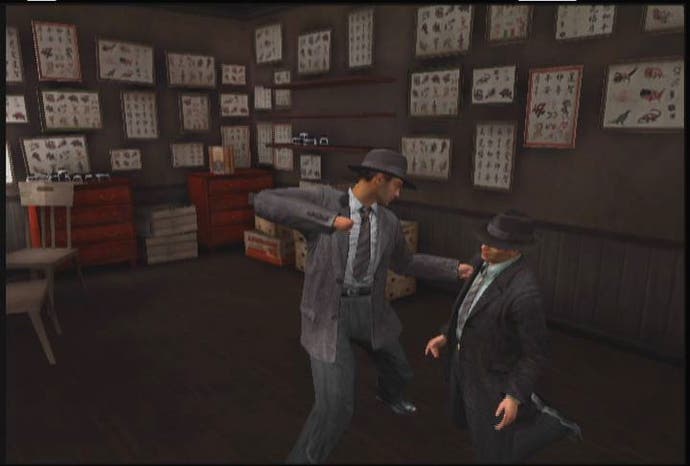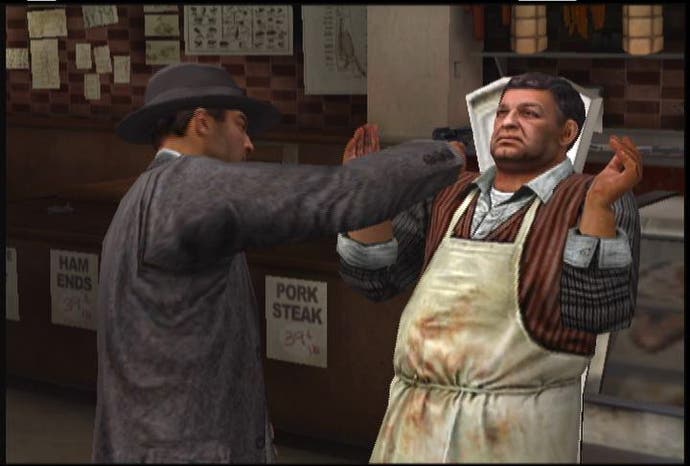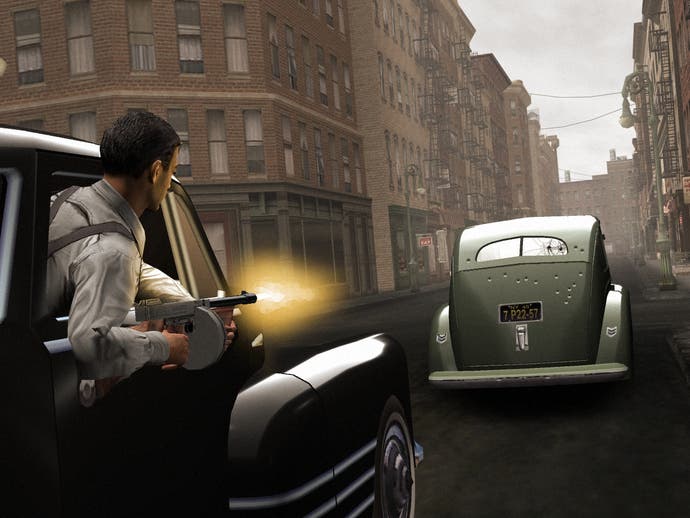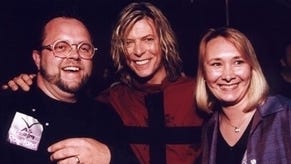The Godfather: The Game Preview
It's one of the toughest jobs ever undertaken by a game developer - but we've seen the first inklings that The Godfather may present gamers and film fans alike with an offer they can't refuse.

This is no ordinary game launch.
For a start, we're in a bar in New York's Little Italy district. That's pretty different, in itself, but it's not what makes this unique. What's unique is that James Caan and Robert Duvall are chatting about videogames on a small stage about four feet in front of me. I could, in fact, shuffle forward, reach out, and tap Colonel Kilgore himself on the leg, although cosy atmosphere notwithstanding, I'm sure that security would materialise out of nowhere to drag me away should I attempt such a thing.
Nonetheless, it's an unusual spectacle; one compounded by the somewhat reverential silence a few moments earlier when a short recording of the late, great Marlon Brando was played. He was talking about videogames too; about how in games, "the audience is doing the acting". Brando, Duvall and Caan? All talking about games? Yes, this is definitely out of the ordinary.
The reason we're all here is because Hollywood - Paramount Pictures, to be precise - has decided to open the locked box which contains one of its most precious possessions. Electronic Arts describes it as "an opportunity"; many suspect that the games industry's own corporate equivalent of the Corleone family opened their pocketbooks and made the film company an offer they couldn't refuse, but either way, Francis Ford Coppola's classic movie trilogy The Godfather is on its way to videogames platforms.
In general, making a movie-licensed game is a relatively straightforward task. It comes with its own special pitfalls, of course, but the source material is laid out for you, art assets and actors are available and, best of all, you have a ready-made market in terms of fans of the film. Only very rare movie titles - The Chronicles of Riddick springs to mind - break out past formulaic retellings of the events of the film. Production values are higher, but the overall thinking hasn't changed that much since the days when Ocean seemed to be pumping out six Arnie or Sly movie tie-ins a week.
The Godfather is different. It has to be different, for so many reasons. For a start, it's thirty years old. Some of the actors are dead, others are older, many are far more famous and in demand than they were at the time that the movie appeared. None of them are under contract any more, of course. Videogames barely even existed when The Godfather first appeared. Consoles had yet to be imagined; home PCs were the territory of science fiction.

That's why it's amazing to see James Caan and Robert Duvall on stage in New York, and Marlon Brando's disembodied voice revealing a surprising understanding of the videogames medium as it echoes around the room in Little Italy. Sonny, Tom and Vito himself have all come back to record new material for The Godfather for the first time in three decades, fleshing out storylines which Coppola considered but ultimately dropped, adding a new backstory and new perspectives to one of the most loved cinema classics of all time. Before even considering how the game itself turns out, that's an astonishing prospect. You can understand Riddick being able to flesh out the backstory of the film, since it was created in close collaboration with the film's creators and alongside the Hollywood production. Returning to The Godfather and being able to do the same thing is incredible, even if it's an immensely daunting creative challenge.
It's a challenge that had to be overcome, though, and it's reassuring to note that EA seems to understand that - understand why The Godfather is so tricky. Put simply, it's not a movie that translates easily into a videogame. It's light on action, heavy on dialogue and emotion. There is little gunplay or driving, and a lot of manipulation and character development. Creating a third-person shoot 'em up based on the film would be a travesty; even building a 1950's Grand Theft Auto clone would be an outrageous abuse. To make The Godfather work as a game, you need to invent new ways of playing games - and to be brutally honest, I had major questions in my mind regarding EA's ability to do just that, and I doubt that I was the only film fan, game fan or even journalist who shuddered a little at the worst-case prospect of what the company might do to Mario Puzo's epic creation.
It would be dishonest to say that all of my misgivings have been dispelled. This isn't just a franchise that needs to be treated with kid gloves, it's one that needs an injection of pure genius to make it work in interactive form - and the few scant minutes of in-game footage which I've seen, promising though they may have been, weren't enough to judge whether that genius has touched this game. However, perhaps even more than seeing Caan, Duvall and Brando return to their roles, talking to the team at EA has shown that the developers understand what they need to do - and that they're determined to get it right.
You can read our extensive interviews with both the creative team and the project's executive producer on the site today. They talk about the need to create a world where there are consequences for your actions; a model of New York in the 1950s where people remember you and your deeds, where killing your adversaries isn't always the right decision - and sometimes it's drastically the wrong decision - and where respect and fear are more powerful currencies than bullets and fists, even if the two sometimes go hand in hand.

How that translates into an actual videogame is a little sketchier. I was shown footage of a number of encounters where your options ranged from intimidation to negotiation to outright physical violence, and even within that there were further options - dish out too little and you won't get what you want, dish out too much and you could end up killing someone, or frightening even a coward into fighting back. These encounters seem to form a fairly major part of the game, which sees you joining the Corleone family as a new recruit and gradually attempting to work your way to the top by extending your influence, respect and business across New York City.
What's not clear, though, is to what extent that progress is free-form - moving around the city, keeping businesses and lieutenants in line, expanding your territory and so on - and to what extent it's scripted. The game weaves and bobs in and around the Godfather storyline, so you'll interact with characters from the film and get to see - or even participate in - key events from the movie. Beyond that, a vast amount of new material has been created for the game, and the hints are that you'll be able to interact with much of it in a freeform, open ended way (with the possibility of even defeating the other families of New York and becoming the Godfather of the whole city, not just of the Corleone family), but just how that'll work hasn't yet been revealed.
What's certain is that in terms of atmosphere, the team at EA Redwood Shores have the right idea. Manhattan is just as you'd imagine it in the 1945-55 era; the streets are populated, steam rises from gratings in the roads, old black cars glide by occasionally as you walk down the pavements. In the background, Nino Rota's classic score trills. Envisaging walking down that street with the respect of the Corleone name on my shoulders isn't difficult, and frankly, I want to believe. Even if my lingering doubts about the difficulty of turning The Godfather into a game haven't been entirely assuaged, the team have done enough to make me hope fervently that the game we see towards the end of this year lives up to this promise.
Back in that bar in Little Italy, we're getting some insight into why it's EA that's got The Godfather in its hands, rather than any other company in the industry. Caan and Duvall have just been asked why they decided to work on the game, given how busy they must both be. While Caan answers more reasonably, Duvall, with an impish grin, reaches his hand out and rubs his fingers together in the globally recognised sign for "lots of money". The audience laughs; on stage with the acting legends, EA corporate communications boss Jeff Brown laughs with them. Having deep pockets has lots of advantages, and sometimes one of those advantages is being able to afford to do things right.
You can read more about The Godfather in our interviews with the game's creative team and executive producer. You can also find new screenshots and trailers elsewhere on the website today.



